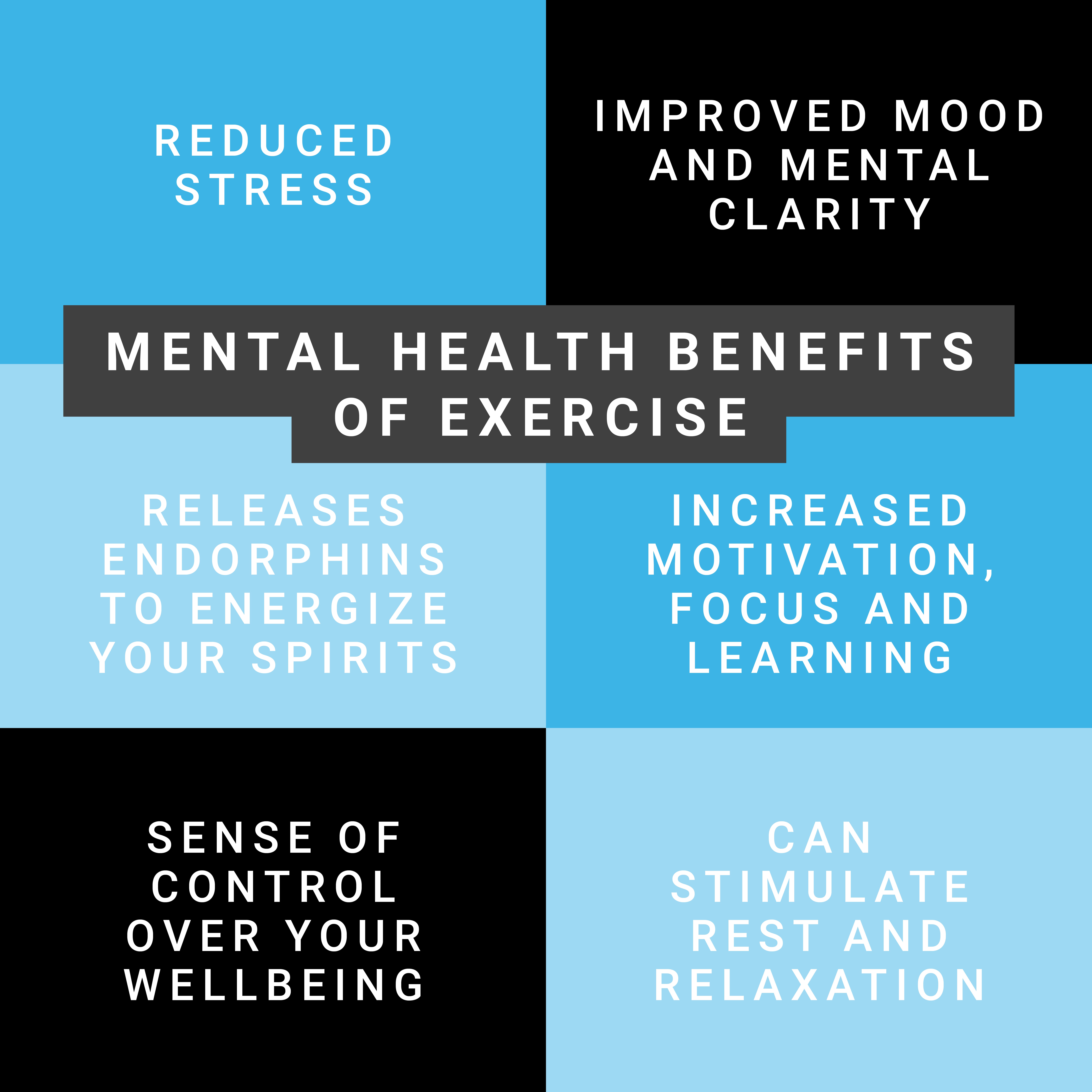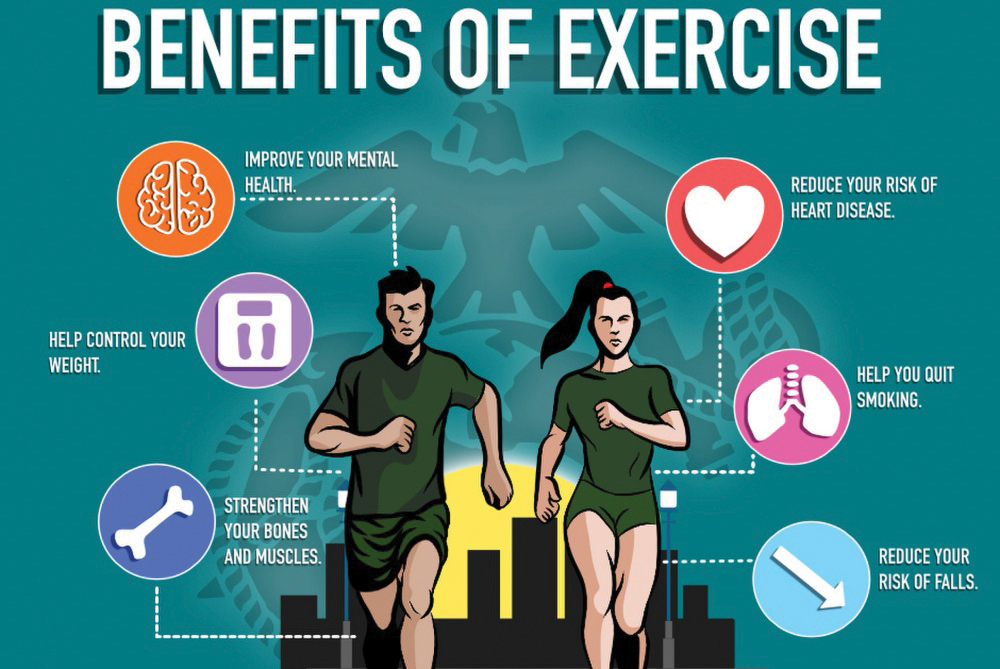Why Working Out Is Good For Your Mental Health
Why working out is good for your mental health? It’s more than just a physical boost; exercise profoundly impacts our brains, influencing mood, stress levels, and even cognitive function. This isn’t just about looking good; it’s about feeling better, sharper, and more resilient in the face of daily challenges. We’ll explore the science behind this powerful connection, examining how exercise alters brain chemistry, combats mood disorders, and enhances overall well-being.
From the release of endorphins, nature’s mood elevators, to the reduction of stress hormones like cortisol, physical activity acts as a powerful tool for mental health. We’ll delve into the specifics of different exercise types – cardio, strength training, yoga – and their unique benefits. We’ll also address common misconceptions and provide practical tips to help you incorporate exercise into your life, regardless of your fitness level.
The Science Behind Exercise’s Mental Health Benefits
Regular physical activity isn’t just about physical fitness; it profoundly impacts mental well-being. Understanding the physiological mechanisms involved helps appreciate its transformative power.
Physiological Changes in the Brain
Exercise triggers a cascade of beneficial changes within the brain. During and after workouts, the body releases endorphins, natural mood elevators that interact with opioid receptors in the brain to reduce pain perception and promote feelings of euphoria. Simultaneously, neurotransmitters like serotonin, dopamine, and norepinephrine, crucial for mood regulation, cognitive function, and motivation, experience increased levels. These biochemical shifts contribute to the mood-boosting effects of exercise.
Impact on Stress Hormones
Chronic stress elevates cortisol and adrenaline, hormones that, while essential for short-term responses, can be detrimental to mental health when persistently elevated. Regular exercise helps regulate the hypothalamic-pituitary-adrenal (HPA) axis, reducing the body’s stress response and lowering cortisol levels. This hormonal balance contributes to improved emotional stability and resilience to stress.
Exercise and Sleep Quality
Sufficient, quality sleep is fundamental to mental health. Exercise significantly improves sleep quality by regulating the circadian rhythm and promoting deeper, more restorative sleep. Studies show a strong correlation between regular physical activity and reduced symptoms of insomnia and other sleep disorders. Improved sleep, in turn, enhances mood, cognitive function, and overall mental well-being.
Exercise and Mood Disorders
Mounting evidence supports exercise as a valuable tool in managing mood disorders like depression and anxiety. Its effectiveness stems from its multifaceted impact on brain chemistry and physiology.
Exercise’s Role in Managing Depression and Anxiety, Why working out is good for your mental health

Exercise combats depression and anxiety by increasing levels of neurotransmitters crucial for mood regulation, reducing stress hormones, and promoting feelings of accomplishment and self-efficacy. This holistic approach helps alleviate symptoms and improve overall mental health.
It’s been tough lately, watching my wife struggle. Her mental health has really taken a toll on both of us, and I’ve been searching for resources to help us navigate this. I found some helpful information on a website addressing the impact of a wife’s poor mental health on her partner’s life: wife’s poor mental health is affecting my life.
On a completely different note, a friend mentioned the excellent woodhull medical and mental health center pediatric dentistry residency program, which sounds amazing for anyone considering that field. It’s good to know there are resources available for both personal challenges and career aspirations.
Effectiveness of Different Exercise Types
Various exercise modalities offer unique benefits. Cardiovascular exercise, such as running or swimming, releases endorphins and improves cardiovascular health, indirectly benefiting mood. Strength training builds self-confidence and improves body image, positively influencing self-esteem. Yoga combines physical postures, breathing techniques, and mindfulness, reducing stress and promoting relaxation. The optimal choice depends on individual preferences and physical capabilities.
It’s been tough lately, watching my wife struggle. Her mental health has really taken a toll on both of us, and I’ve been looking for resources to help us navigate this. I found some helpful information on how to cope when a wife’s poor mental health is affecting my life , which has been a good starting point.
Separately, I’ve also been researching options for our kids’ dental care, and came across the Woodhull Medical and Mental Health Center pediatric dentistry residency program – it looks promising.
Exercise Compared to Other Treatments
Exercise is often used in conjunction with other treatments for depression and anxiety, such as therapy and medication. While it’s not a replacement for professional help, it acts as a valuable complementary therapy, enhancing the effectiveness of other interventions. Research shows that combining exercise with therapy or medication often leads to superior outcomes compared to using only one approach.
Boosting Self-Esteem and Confidence
The positive psychological effects of exercise extend beyond mood regulation, impacting self-esteem and confidence significantly.
Achieving Fitness Goals and Self-Image

Achieving fitness goals, whether it’s running a 5k or lifting heavier weights, fosters a sense of accomplishment and self-efficacy. These successes build confidence and improve self-image, positively impacting self-perception and overall mental well-being.
Psychological Mechanisms Linking Activity to Self-Esteem
The link between physical activity and increased self-esteem is multifaceted. Improved physical fitness enhances body image, leading to greater self-acceptance and confidence. The discipline and commitment required for regular exercise cultivate self-discipline and resilience, qualities that extend to other areas of life.
Group Fitness and Social Connections
Participating in group fitness classes or team sports provides social interaction and a sense of belonging. The shared experience of working towards common goals strengthens social connections and boosts self-worth, reinforcing positive self-perception.
Cognitive Enhancement and Focus
The benefits of exercise extend beyond mood and self-esteem, significantly impacting cognitive function.
Improved Cognitive Function, Memory, and Concentration
Regular exercise enhances blood flow to the brain, providing more oxygen and nutrients crucial for optimal cognitive function. This improved blood flow enhances memory, concentration, and overall cognitive performance. Studies have shown that even moderate exercise can lead to noticeable improvements in cognitive abilities.
Impact on Brain Plasticity and Neurogenesis
Exercise promotes brain plasticity, the brain’s ability to adapt and reorganize itself. It also stimulates neurogenesis, the formation of new brain cells, particularly in the hippocampus, a region crucial for learning and memory. These processes contribute to improved cognitive function and resilience against age-related cognitive decline.
Research on Exercise and Cognitive Performance
Numerous studies have demonstrated the link between exercise and improved cognitive performance. Research consistently shows that regular physical activity enhances attention, processing speed, working memory, and executive functions. These findings underscore the importance of incorporating exercise into daily routines to maintain and improve cognitive health.
Stress Reduction and Coping Mechanisms: Why Working Out Is Good For Your Mental Health
Exercise serves as a powerful tool for stress reduction and the development of effective coping mechanisms.
Physiological Processes of Stress Reduction
Exercise reduces stress by lowering cortisol levels, promoting relaxation responses, and releasing endorphins. The rhythmic nature of many exercises, such as running or swimming, can induce a meditative state, further promoting relaxation and stress reduction.
Incorporating Exercise into a Daily Routine
To effectively manage stress through exercise, start gradually. Begin with short, manageable sessions (15-20 minutes) and gradually increase duration and intensity. Schedule exercise at times that fit your routine and find activities you enjoy. Consistency is key.
Stress-Reducing Exercises and Their Benefits
- Yoga: Combines physical postures, breathing techniques, and mindfulness to reduce stress and improve flexibility.
- Tai Chi: Gentle, flowing movements improve balance, coordination, and reduce stress.
- Walking/Running: Cardiovascular exercise releases endorphins and improves mood.
- Strength Training: Builds confidence and reduces stress through physical accomplishment.
Practical Advice for Getting Started
Embarking on a fitness journey can seem daunting, but with a structured approach and realistic expectations, success is attainable.
Sample Workout Plan for Beginners
Begin with 2-3 sessions per week, each lasting 30-45 minutes. Focus on low-impact activities like walking or cycling. Gradually increase duration and intensity as fitness improves. Incorporate a mix of cardiovascular exercise and strength training. Always prioritize proper form to avoid injury.
Overcoming Barriers to Starting and Maintaining an Exercise Routine

Common barriers include lack of time, motivation, and access to facilities. Schedule exercise into your day like any other important appointment. Find an exercise buddy for motivation and accountability. Explore free or low-cost options, such as walking or bodyweight exercises.
Finding Enjoyable Activities
Long-term adherence to an exercise routine depends heavily on enjoyment. Experiment with different activities until you find something you genuinely enjoy. Listen to music, podcasts, or audiobooks during workouts to enhance the experience. Consider joining a fitness class or team sport to add a social element.
Addressing Misconceptions about Exercise and Mental Health
Several misconceptions surrounding exercise and mental health can hinder individuals from reaping its benefits.
Common Misconceptions
One common misconception is that exercise needs to be intense or lengthy to be effective. Even moderate exercise provides significant mental health benefits. Another misconception is that exercise is only beneficial for those with diagnosed mental health conditions. Regular physical activity enhances mental well-being for everyone.
Debunking Misconceptions
Scientific research consistently demonstrates the positive impact of exercise on mental health, regardless of intensity or pre-existing conditions. Sharing personal success stories and highlighting the research-based evidence helps dispel these myths.
Resources and Support Systems
Many resources are available for individuals seeking help with mental health and physical activity. Mental health professionals can provide guidance and support. Fitness professionals can help develop personalized exercise plans. Online communities and support groups offer peer support and encouragement.
Ultimately, the link between exercise and mental health is undeniable. By understanding the science behind the benefits and implementing a consistent exercise routine tailored to your needs and preferences, you can harness the incredible power of physical activity to improve your mood, reduce stress, sharpen your mind, and cultivate a stronger, healthier you. Remember, it’s not about achieving perfection, but about making consistent progress towards a happier, healthier lifestyle.
Start small, find activities you enjoy, and celebrate every step of the way.
Share this content:
